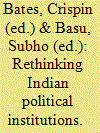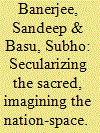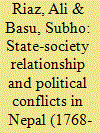|
|
|
Sort Order |
|
|
|
Items / Page
|
|
|
|
|
|
|
| Srl | Item |
| 1 |
ID:
099244


|
|
|
|
|
| Publication |
2010.
|
| Summary/Abstract |
Through a study of hitherto unexplored geography textbooks written in Bengali between 1845 and 1880, this paper traces the evolution of a geographic information system related to ethnicity, race, and space. This geographic information system impacted the mentality of emerging educated elites in colonial India who studied in the newly established colonial schools and played a critical role in developing and articulating ideas of the territorial nation-state and the rights of citizenship in India. The Bengali Hindu literati believed that the higher location of India in such a constructed hierarchy of civilizations could strengthen their claims to rights of citizenship and self-government. These nineteenth century geography textbooks asserted clearly that high caste Hindus constituted the core ethnicity of colonial Indian society and all others were resident outsiders. This knowledge system, rooted in geography/ethnicity/race/space, and related to the hierarchy of civilizations, informed the Bengali intelligentsia's notion of core ethnicity in the future nation-state in India with Hindu elites at its ethnic core.
|
|
|
|
|
|
|
|
|
|
|
|
|
|
|
|
| 2 |
ID:
120842


|
|
|
|
|
| Publication |
2013.
|
| Summary/Abstract |
In 2011, after thirty-four years in power, the Communist Party of IndiaMarxist-led Left Front in West Bengal was voted out of power. The Left Front was the world's longest running communist government to be elected to office. The Left Front governed a population larger than most European, African, and Latin American democracies. This essay examines the rise and decline of the parliamentary communist movement in Bengal. The authors argue that the prominence of the communist movement can be traced to a social imaginaire and a notion of "social citizenship" that the (undivided) communists developed through their participation in grassroots-level workers, peasants, and refugee movements, and equally crucially, through hegemonic interventions in "culture" since the 1940s. This social imaginaire became the basis of a "commonsensical idiom" in Bengal through the political practice of the communists, parliamentary and otherwise. The decline of the parliamentary communist influence started when their core constituency of peasants and workers perceived them to be violating this basis of social citizenship in the wake of their adoption of neoliberal policies of development beginning in the 1990s. The regional noncommunist opposition in West Bengal in 2011 captured the imagination of the electorate by appropriating and translating this long developed notion of social citizenship against the Left government.
|
|
|
|
|
|
|
|
|
|
|
|
|
|
|
|
| 3 |
ID:
066438


|
|
|
|
|
| Publication |
London, Anthem Press, 2005.
|
| Description |
xxvi, 262p.
|
| Series |
Anthem South Asian studies
|
| Contents |
Crispin Bates is the Series Editor
|
| Standard Number |
1843310805
|
|
|
|
|
|
|
|
|
|
|
|
Copies: C:1/I:0,R:0,Q:0
Circulation
| Accession# | Call# | Current Location | Status | Policy | Location |
| 050281 | 327.54/BAT 050281 | Main | On Shelf | General | |
|
|
|
|
| 4 |
ID:
139683


|
|
|
|
|
| Summary/Abstract |
This article examines changing conceptions of the Himalaya in nineteenth-century Bengali travelogues from that of a sacred space to a spatial metaphor of a putative nation-space. It examines sections of Devendranath Tagore's autobiography, written around 1856–58, before discussing the travelogues of Jaladhar Sen and Ramananda Bharati from the closing years of the nineteenth century. The article argues that for Tagore the mountains are the ‘holy lands of Brahma’, while Sen and Bharati depict the Himalaya with a political slant and secularize the space of Hindu sacred geography. It contends that this process of secularization posits Hinduism as the civil religion of India. The article further argues that the later writers make a distinction between the idea of a ‘homeland’ and a ‘nation’. Unlike in Europe, where the ideas of homeland and nation overlap, these writers imagined the Indian nation-space as one that encompassed diverse ethno-linguistic homelands. It contends that the putative nation-space articulates the hegemony of the Anglo-vernacular middle classes, that is, English educated, upper caste, male Hindus where women, non-Hindus, and the labouring classes are marginalized.
|
|
|
|
|
|
|
|
|
|
|
|
|
|
|
|
| 5 |
ID:
076871


|
|
|
|
|
| Publication |
2007.
|
| Summary/Abstract |
For nearly a decade, from the declaration of Maoist 'people's war' in January 1996 to the formation of new alliance for the restoration of democracy in December 2005, Nepal has experienced a three-way power struggle between Maoist insurgents who want a republic based on egalitarian principles, elected politicians who want an unfettered role in policy making and a monarch bent upon a return to pre-democratic Nepal. This article attempts to explain this crisis from a structural-historical perspective and argues that fundamental to the understanding of this crisis is the state-society relationship. The article contends that the complex use of the constructed Hindu identity to provide cultural legitimacy to the monarchical political order, that has existed since the inception of the state in the 18th century to the democratic revolution in 1990, has contributed to the political alienation of substantial segment of ethnically, socially and economically marginalized population from the Nepalese state. By examining complex interactions among political and economic factors, this article further contends that the unrepresentative process of state formation and the tradition of governance have contributed to the alienation of the citizens from the state and created a political space for violent rebellion and state terrorism undermining fragile but emerging democratic institutions.
|
|
|
|
|
|
|
|
|
|
|
|
|
|
|
|
|
|
|
|
|